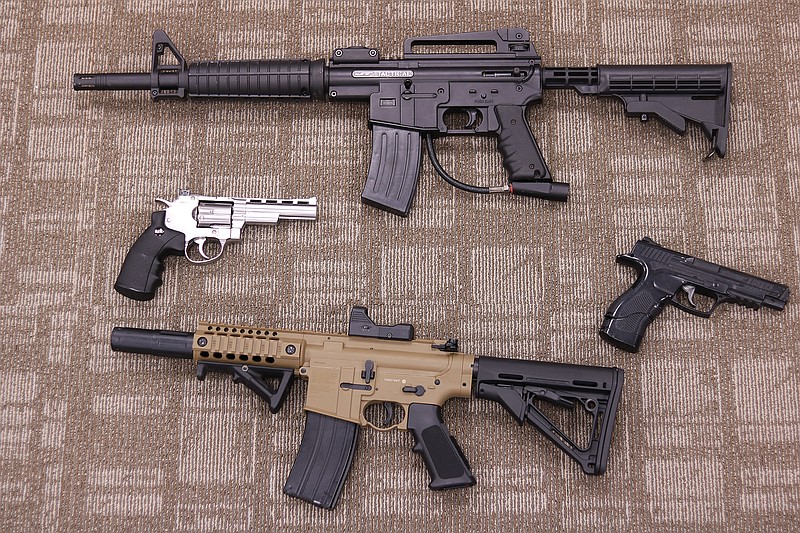Central Arkansas law enforcement agencies in many circumstances must collaborate to fight violent crime in the area.
The "GET ROCK" task force, or the Gang Enforcement Task Force, has the job of fighting violent crime in Central Arkansas, including Hot Springs, Pine Bluff, Pulaski County and other areas.
According to FBI Violent Crimes Supervisory Special Agent Tonja Sablatura, it's common around the country to have these kinds of task forces. What makes GET ROCK unusual is the involvement of local officers.
"They work a wide variety of criminal violations, and it's not just violent gangs," Sablatura said. "It's drug trafficking organizations, murder-for-hire cases, shootings, homicides. Any type of crime you think of, a lot of times we're involved."
GET ROCK teams FBI special agents with local officers from Little Rock, North Little Rock, Pine Bluff and other areas to fight violent crime with the officers being deputized under the FBI, allowing them to pursue cases both as federal agents and local law enforcement.
These officers from the police departments are specially trained by the FBI, according to Sablatura, and they train together on a monthly basis.
"The participants of GET ROCK are some of the agencies' that participate best guys," Sablatura said. "They are seasoned detectives. They are seasoned special agents. They are very good at what they do."
The task force did not always have the same number of officers. Sablatura said that before the 2017 Power Ultra Nightclub shooting in Little Rock, there were only a couple of task force officers on the team.
"After that shooting, the governor really inspired more participation from local and state law enforcement agencies to come together with the federal agencies to address violent crime and be able to be postured to surge resources in whatever direction was necessary," Sablatura said.
The task force is made up of numerous agencies including Little Rock police, North Little Rock police, Pine Bluff police, the Arkansas Community Correction Department, Arkansas State Police and the National Guard.
Although the operations are both large- and small-scale, the group is specifically designed to handle bigger incidents.
According to Sablatura, the task force was heavily involved in the Sylvan Hills High School shooting threats in February 2020.
"That made the big news because it was very disruptive," Sablatura said. "Both the high school and the middle school were receiving threats and were having to close school. We worked with the Sylvan Hills Police Department as well as the school administrators to help identify and track down, it ended up being, multiple students making those threats."
This included tracking down IP addresses, sending subpoenas, conducting interviews and conducting polygraphs, according to Sablatura. Investors also consulted the FBI's behavioral analyst to determine how serious the threats were.
"A lot of times our behavior analyst can look at a statement and say, 'well it is a threat, but we would say we're confident it's not somebody that's going to carry it out' or 'we're concerned with this one,'" Sablatura said.
During protests last summer, GET ROCK was watching the backs of officers keeping the peace during protests and seized bricks, stimulants and bottles filled with fuel that were being thrown at the police, according to Sablatura.
With violent crime up across the nation and in Arkansas over the past year, Sablatura said the task force takes steps to combat violent crime actively but also in other ways such as its WAVE (Working Against Violent Entities) operations.
"For example, we did a WAVE operation this week working with Arkansas State Police, North Little Rock [Police] and Little Rock [Police]," Sablatura said. "In a matter of hours, focusing on an area of high crime, we had arrested five individuals, two who were already out on parole, one who had outstanding felony warrants; seized three guns including a drum magazine; and recovered a stolen car."
The relationships being in place between federal and local authorities can help scale things up to larger investigations, according to Little Rock Police spokesman Eric Barnes.
"Our relationship with those federal partners is maximized with our investigations," Barnes said. "So if we're experiencing something here on a local level that we believe is something that's large scale, we have those communications that are tapped in already and we can start working that investigation."
In a recent example, 69-year-old Jeri Dianna Tarter of Jacksonville was arrested in October in connection with what prosecutors said was an attempted murder-for-hire of her daughter's ex-husband.
Rob Bell, a member of the FBI's GET ROCK task force, said he contacted Tarter posing as a man from Memphis offering to take out the hit.
Barnes said this was an example of one of the task force members assisting with a federal investigation.
"We work with them on their investigations, as well, in ways we can help," Barnes said.
